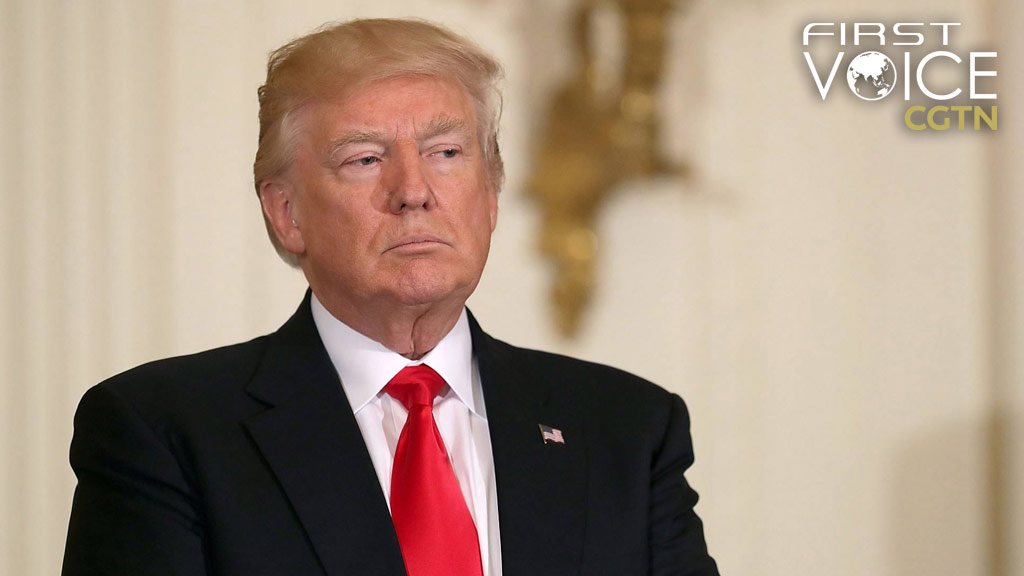
Editor's note: CGTN's First Voice goes beyond the headlines to dissect, examine and analyze hot-off-the-press issues and break down breaking news into simple bits. The daily column offers a Chinese perspective on global current events to help you shape your views on matters that shape your life.
The killing of top Iranian general Qasem Soleimani has been particularly disturbing because, up until this point, the U.S. hasn't offered a coherent strategy for doing so.
The Republicans have mostly heralded President Donald Trump's action for ridding the world of an "enemy" of the United States without talking about how to manage the relationship with Iran afterwards. The Democrats, like former Vice President Joe Biden and Senator Elizabeth Warren, have accused Trump of taking the country dangerously close to a war.
Speaker of the U.S. House of Representatives Nancy Pelosi said the White House's War Powers notification is raising "serious and urgent questions about the timing, manner and justification" of the act. The New York Times said that top Pentagon officials were "stunned" by President Trump choosing this "extreme option". And it is reported that, months ago, Secretary of State Mike Pompeo lobbied Trump to take out Soleimani, but was turned down by both the White House and the Pentagon because of the cost of a potential escalation with Tehran.
Tucker Carlson, a staunch Trump-leaning host on Fox News, criticized Washington for providing little to none explanation on the benefit of killing Soleimani and the potential of starting a new war. He said on his show that Washington "has wanted war with Iran for decades … they may finally get it."
And Trump himself has offered no plan for managing the crisis except fiery rhetoric and threats. He has threatened to target Iranian cultural sites and sanction Iraq. Interestingly, this time, Pompeo became the dove amongst the hawks and attempted to walk back on his boss's rhetoric. But, his efforts have been drowned by discussions of World War III and the possibility of a new draft.

Mourners gather for the funeral of Qasem Soleimani. /Photo via Reuters
Mourners gather for the funeral of Qasem Soleimani. /Photo via Reuters
The U.S. has said that it is open to negotiations with Iran. But, without a coherent rhetoric and messaging coming out of the U.S., the United States cannot articulate its position in a negotiation with Iran. And expecting Iran to come to the negotiating table, when knowing that its high officials could be executed by the U.S. on a whim without a reasonable explanation, would not be a wise assessment.
Especially after the country is hardened by Soleimani's killing. According to a poll conducted by the University of Maryland in October 2019, Soleimani enjoyed 82 percent favorability, highest amongst all prominent Iranians. Negative attitude towards the United States was at 86 percent.
And the U.S. action has just deepened these feelings. During an emergency session after Soleimani's killing, Iranian lawmakers chanted "death to America" in unison. A multi-city funeral procession is being carried out, with tens of thousands of mourners flooding the streets. It is reported that never has a single person received a multi-city ceremony in the history of the Islamic Republic of Iran – not even its founder Ayatollah Ruhollah Khomeini.
Th U.S. cannot expect that an Iran, united in taking a hardline approach, will come to the table under duress while the U.S. itself is facing internal questions over the motives and management of Soleimani's killing.
The world is eager for the situation to be resolved. With Iran rolling back its commitment to the Iran nuclear deal, this corner stone to regional security is on the verge of collapse. European nations are forced to raise their security alert in preparation for retaliations. The P5+1 countries (China, France, Germany, Russia, the UK, and the U.S.), with the exception of the U.S., are calling for de-escalation in the region. If the U.S. expects a peaceful resolution, it needs a clear position as a start.
Script writer: Huang Jiyuan
(If you want to contribute and have specific expertise, please contact us at opinions@cgtn.com.)